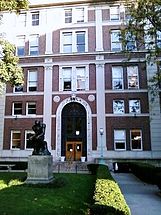
Metaphysics is the branch of philosophy that studies the first principles of being, identity and change, space and time, causality, necessity and possibility. It includes questions about the nature of consciousness and the relationship between mind and matter. The word "metaphysics" comes from two Greek words that, together, literally mean "after or behind or among [the study of] the natural". It has been suggested that the term might have been coined by a first century CE editor who assembled various small selections of Aristotle’s works into the treatise we now know by the name Metaphysics.

Philosophy of science is a branch of philosophy concerned with the foundations, methods, and implications of science. The central questions of this study concern what qualifies as science, the reliability of scientific theories, and the ultimate purpose of science. This discipline overlaps with metaphysics, ontology, and epistemology, for example, when it explores the relationship between science and truth. Philosophy of science focuses on metaphysical, epistemic and semantic aspects of science. Ethical issues such as bioethics and scientific misconduct are often considered ethics or science studies rather than philosophy of science.

Alexander Bain was a Scottish philosopher and educationalist in the British school of empiricism and a prominent and innovative figure in the fields of psychology, linguistics, logic, moral philosophy and education reform. He founded Mind, the first ever journal of psychology and analytical philosophy, and was the leading figure in establishing and applying the scientific method to psychology. Bain was the inaugural Regius Chair in Logic and Professor of Logic at the University of Aberdeen, where he also held Professorships in Moral Philosophy and English Literature and was twice elected Lord Rector of the University of Aberdeen.

Analytic philosophy is a branch and tradition of philosophy using analysis which is popular in the Western World and particularly the Anglosphere, which began around the turn of the 20th century in the contemporary era in the United Kingdom, United States, Canada, Australia, New Zealand and Scandinavia and continues today. Writing in 2003, John Searle claimed that "the best philosophy departments in the United States are dominated by analytic philosophy."

An academic discipline or field of study is a branch of knowledge, taught and researched as part of higher education. A scholar's discipline is commonly defined by the university faculties and learned societies to which they belong and the academic journals in which they publish research.

Modern philosophy is philosophy developed in the modern era and associated with modernity. It is not a specific doctrine or school, although there are certain assumptions common to much of it, which helps to distinguish it from earlier philosophy.

Contemporary philosophy is the present period in the history of Western philosophy beginning at the early 20th century with the increasing professionalization of the discipline and the rise of analytic and continental philosophy. Contemporary philosophy focuses on epistemology, metaphysics, logic, ethics, aesthetics, the philosophy of mind, the philosophy of language, political philosophy, the history of debates in these areas, and philosophical examination of the assumptions, methods and claims of other areas of focus in science and social science.

Philip Stuart Kitcher is a British philosophy professor teaching at Columbia University who specialises in the philosophy of science, the philosophy of biology, the philosophy of mathematics, the philosophy of literature, and more recently pragmatism.
The following outline is provided as an overview of and topical guide to philosophy:

Richard Newell Boyd was an American philosopher, who spent most of his career teaching philosophy at Cornell University where, latterly, he was Susan Linn Sage Professor of Philosophy and Humane Letters Emeritus. He specialized in epistemology, the philosophy of science, of language, and of mind.

Errol Eustace Harris, sometimes cited as E. E. Harris, was a South African philosopher. His work focused on developing a systematic and coherent account of the logic, metaphysics, and epistemology implicit in contemporary understanding of the world. Harris held that, in conjunction with empirical science, the Western philosophical tradition, in its commitment to the ideal of reason, contains the resources necessary to accomplish this end. He celebrated his 100th birthday in 2008.

Philosophy is the study of general and fundamental questions, such as those about existence, reason, knowledge, values, mind, and language. Such questions are often posed as problems to be studied or resolved. Some sources claim the term was coined by Pythagoras, others dispute this story, arguing that Pythagoreans merely claimed use of a preexisting term. Philosophical methods include questioning, critical discussion, rational argument, and systematic presentation.

Western philosophy encompasses the philosophical thought and work of the Western world. Historically, the term refers to the philosophical thinking of Western culture, beginning with the ancient Greek philosophy of the pre-Socratics. The word philosophy itself originated from the Ancient Greek philosophía (φιλοσοφία), literally, "the love of wisdom".

The New York University Graduate School of Arts and Science (GSAS) is a school within New York University (NYU) founded in 1886 by Henry Mitchell MacCracken, establishing NYU as the second academic institution in the United States to grant Ph.D. degrees on academic performance and examination. The School is housed in the Silver Center, several departments have their own buildings and houses around Washington Square. The graduate program at Courant Institute of Mathematical Sciences, although run independently, is formally associated with the graduate school.
Patricia W. Kitcher is the Roberta and William Campbell Professor of Philosophy at Columbia University, widely known for her work on Immanuel Kant and on philosophy of psychology. She has held many positions at different universities, is a founding chair of a committee at the University of California, and has a lead role in multiple professional organizations. Kitcher's most notable interests throughout her career regard cognition and Kantian ethics. She is the author of multiple papers and two books.
Béatrice Longuenesse is a Silver Professor of Philosophy Emerita at New York University. Her work focuses on Immanuel Kant, Georg Wilhelm Friedrich Hegel, and the philosophy of mind. She is a fellow of the American Academy of Arts and Sciences. Longuenesse is one of the most prominent living Kant scholars, and her works have generated significant discussion around parts of Kant's corpus that were previously largely overlooked.

The New York University Department of Philosophy is ranked 1st in the US and 1st in the English-speaking world as of the most recent edition of the Philosophical Gourmet Report from 2017–18. It is also ranked 1st in the world by the 2021 QS World University Rankings, and is internationally renowned. It has particular strengths in epistemology, history of philosophy, logic, metaphysics, moral and political philosophy, philosophy of language, philosophy of logic and philosophy of mathematics, and philosophy of mind. The department offers B.A., M.A., and Ph.D. degrees in philosophy, as well as a minor in philosophy and a joint major in language and mind with the NYU Departments of Linguistics and Psychology. It is home to the New York Institute of Philosophy, a research center that supports multi-year projects, public lectures, conferences, and workshops in the field, as well as outreach programs to teach New York City high school students interested in philosophy.










